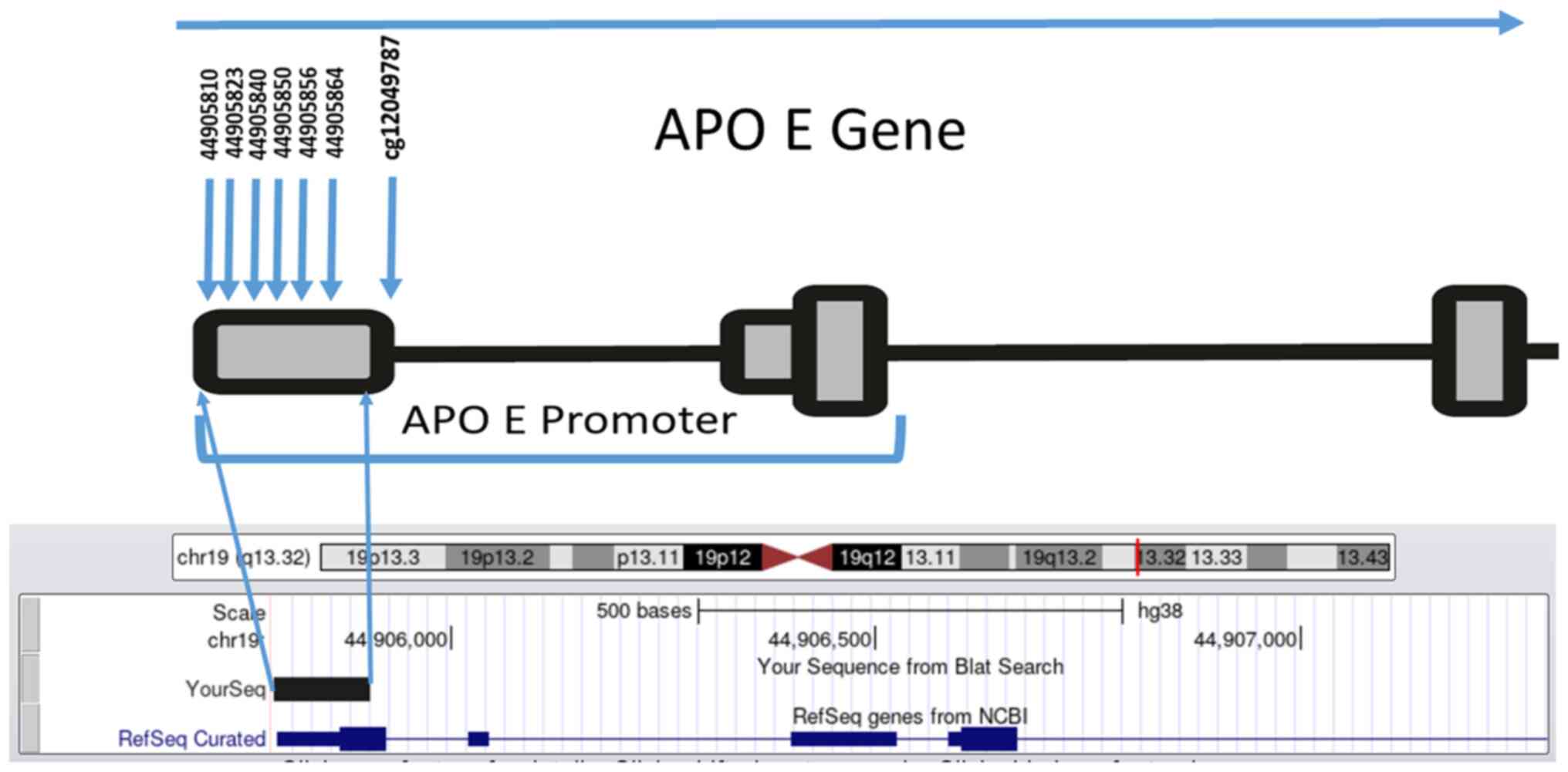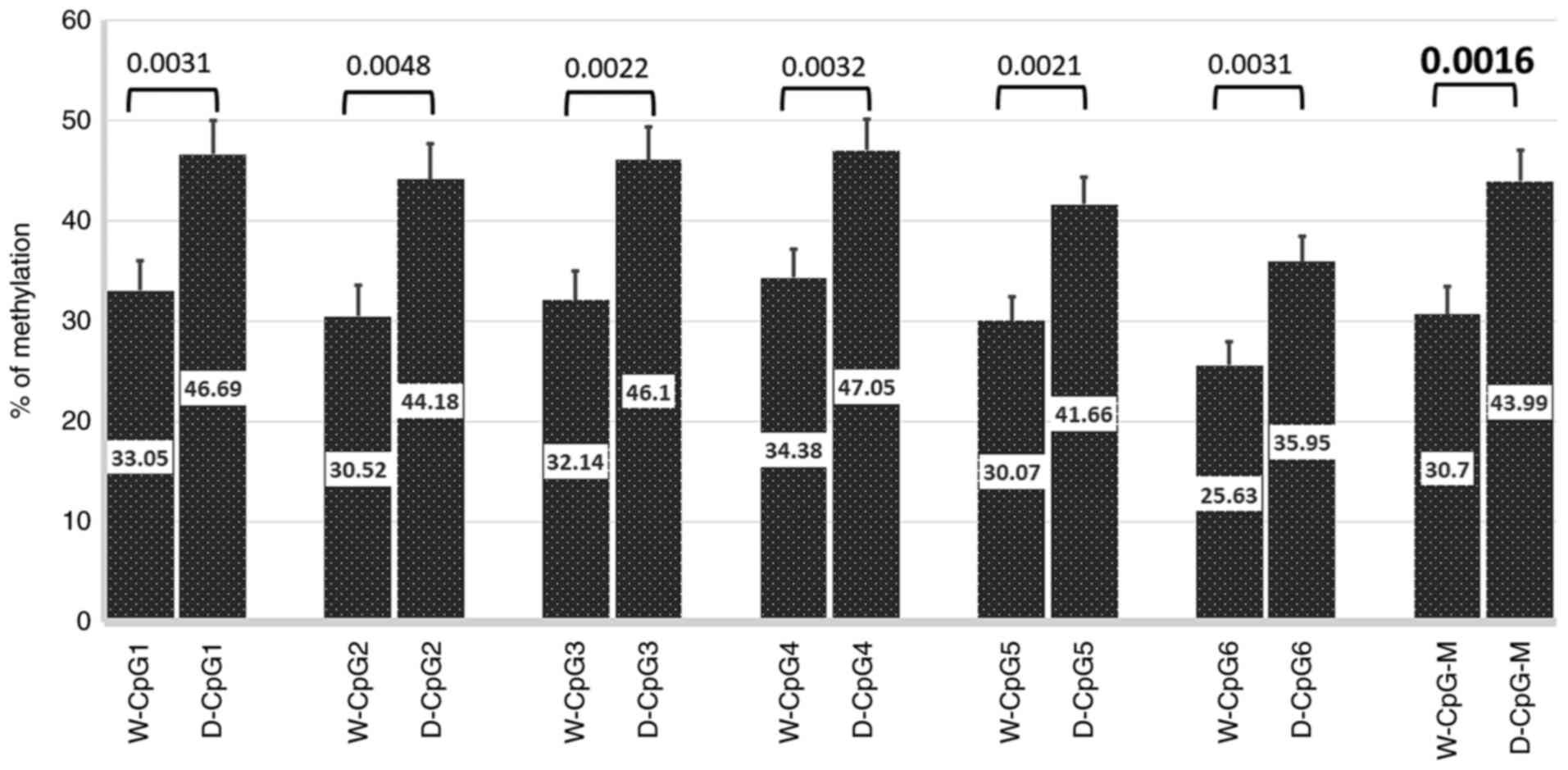|
1
|
Yu CE and Foraker J: Epigenetic
considerations of the APOE gene. [corrected]. Biomol Concepts.
6:77–84. 2015.PubMed/NCBI View Article : Google Scholar
|
|
2
|
Belloy ME, Napolioni V and Greicius MD: A
Quarter century of APOE and Alzheimer's disease: Progress to date
and the path forward. Neuron. 101:820–838. 2019.PubMed/NCBI View Article : Google Scholar
|
|
3
|
Ashiq S and Ashiq K: The association of
apolipoprotein-E (APOE) gene polymorphisms with coronary artery
disease: A systematic review and meta-analysis. Egypt J Med Hum
Genet. 22(16)2021.
|
|
4
|
Smelt AH and de Beer F: Apolipoprotein E
and familial dysbetalipoproteinemia: Clinical, biochemical, and
genetic aspects. Semin Vasc Med. 4:249–257. 2004.PubMed/NCBI View Article : Google Scholar
|
|
5
|
Sun Y, Wei R, Yan D, Xu F, Zhang X, Zhang
B, Yimiti D, Li H, Sun H, Hu C, et al: Association between APOE
polymorphism and metabolic syndrome in Uyghur ethnic men. BMJ Open.
6(e010049)2016.PubMed/NCBI View Article : Google Scholar
|
|
6
|
Villeneuve S, Brisson D, Marchant NL and
Gaudet D: The potential applications of apolipoprotein E in
personalized medicine. Front Aging Neurosci. 6(154)2014.PubMed/NCBI View Article : Google Scholar
|
|
7
|
Maitland-van der Zee AH, Stricker BH,
Klungel OH, Mantel-Teeuwisse AK, Kastelein JJ, Hofman A, Leufkens
HG, van Duijn CM and de Boer A: Adherence to and dosing of
beta-hydroxy-beta-methylglutaryl coenzyme A reductase inhibitors in
the general population differs according to apolipoprotein
E-genotypes. Pharmacogenetics. 13:219–223. 2003.PubMed/NCBI View Article : Google Scholar
|
|
8
|
Cai C, Wen Z and Li L: The relationship
between ApoE gene polymorphism and the efficacy of statins
controlling hyperlipidemia. Am J Transl Res. 13:6772–6777.
2021.PubMed/NCBI
|
|
9
|
Zhang L, He S, Li Z, Gan X, Li S, Cheng X,
Yang N and Zheng F: Apolipoprotein E polymorphisms contribute to
statin response in Chinese ASCVD patients with dyslipidemia. Lipids
Health Dis. 18(129)2019.PubMed/NCBI View Article : Google Scholar
|
|
10
|
Bizzarro A, Seripa D, Acciarri A, Matera
MG, Pilotto A, Tiziano FD, Brahe C and Masullo C: The complex
interaction between APOE promoter and AD: An Italian case-control
study. Eur J Hum Genet. 17:938–945. 2009.PubMed/NCBI View Article : Google Scholar
|
|
11
|
Bekris LM, Lutz F and Yu CE: Functional
analysis of APOE locus genetic variation implicates regional
enhancers in the regulation of both TOMM40 and APOE. J Hum Genet.
57:18–25. 2012.PubMed/NCBI View Article : Google Scholar
|
|
12
|
Ciceri F, Rotllant D and Maes T:
Understanding epigenetic alterations in Alzheimer's and Parkinson's
disease: Towards targeted biomarkers and therapies. Curr Pharm Des.
23:839–857. 2017.PubMed/NCBI View Article : Google Scholar
|
|
13
|
Bae MG, Kim JY and Choi JK: Frequent
hypermethylation of orphan CpG islands with enhancer activity in
cancer. BMC Med Genomics. 9 (Suppl 1)(S38)2016.PubMed/NCBI View Article : Google Scholar
|
|
14
|
Kumar R, Nandhini LP, Kamalanathan S,
Sahoo J and Vivekanadan M: Evidence for current diagnostic criteria
of diabetes mellitus. World J Diabetes. 7:396–405. 2016.PubMed/NCBI View Article : Google Scholar
|
|
15
|
Jellinger PS, Dickey RA, Ganda OP, Mehta
AE, Nguyen TT, Rodbard HW, Seibel JA, Shepherd MD and Smith DA:
AACE Lipid Guidelines Committee. The American Association of
Clinical Endocrinologists. AACE medical guidelines for clinical
practice for the diagnosis and treatment of dyslipidemia and
prevention of atherogenesis. Endocr Pract. 6:162–213.
2000.PubMed/NCBI
|
|
16
|
Goodyear MD, Krleza-Jeric K and Lemmens T:
The declaration of Helsinki. BMJ. 335:624–625. 2007.PubMed/NCBI View Article : Google Scholar
|
|
17
|
Krishnaveni P and Gowda VM: Assessing the
validity of friedewald's formula and anandraja's formula for serum
LDL-cholesterol calculation. J Clin Diagn Res. 9:BC01–BC04.
2015.PubMed/NCBI View Article : Google Scholar
|
|
18
|
Ereqat S, Cauchi S, Eweidat K, Elqadi M
and Nasereddin A: Estrogen receptor 1 gene polymorphisms (PvuII and
XbaI) are associated with type 2 diabetes in Palestinian women.
PeerJ. 7(e7164)2019.PubMed/NCBI View Article : Google Scholar
|
|
19
|
Shao Y, Shaw M, Todd K, Khrestian M,
D'Aleo G, Barnard PJ, Zahratka J, Pillai J, Yu CE, Keene CD, et al:
DNA methylation of TOMM40-APOE-APOC2 in Alzheimer's disease. J Hum
Genet. 63:459–471. 2018.PubMed/NCBI View Article : Google Scholar
|
|
20
|
Shatwan IM, Winther KH, Ellahi B, Elwood
P, Ben-Shlomo Y, Givens I, Rayman MP, Lovegrove JA and Vimaleswaran
KS: Association of apolipoprotein E gene polymorphisms with blood
lipids and their interaction with dietary factors. Lipids Health
Dis. 17(98)2018.PubMed/NCBI View Article : Google Scholar
|
|
21
|
Satizabal CL, Samieri C, Davis-Plourde KL,
Voetsch B, Aparicio HJ, Pase MP, Romero JR, Helmer C, Vasan RS,
Kase CS, et al: APOE and the association of fatty acids with the
risk of stroke, coronary heart disease, and mortality. Stroke.
49:2822–2829. 2018.PubMed/NCBI View Article : Google Scholar
|
|
22
|
Duman BS, Oztürk M, Yilmazer S and Hatemi
H: Apolipoprotein E polymorphism in Turkish subjects with Type 2
diabetes mellitus: Allele frequency and relation to serum lipid
concentrations. Diabetes Nutr Metab. 17:267–274. 2004.PubMed/NCBI
|
|
23
|
Galal AA, Abd Elmajeed AA, Elbaz RA, Wafa
AM and Elshazli RM: Association of apolipoprotein E gene
polymorphism with the risk of T2DM and obesity among Egyptian
subjects. Gene. 769(145223)2021.PubMed/NCBI View Article : Google Scholar
|
|
24
|
Alharbi KK, Khan IA and Syed R:
Association of apolipoprotein E polymorphism with type 2 diabetes
mellitus in a Saudi population. DNA Cell Biol. 33:637–641.
2014.PubMed/NCBI View Article : Google Scholar
|
|
25
|
Ali I, Kharma A, Samara M, Odeh S, Jaradat
N, Zaid AN and Ahmad MA: Prevalence of dyslipidemia in undiagnosed
palestinian men: A cross-sectional study. J Lipids.
2019(3473042)2019.PubMed/NCBI View Article : Google Scholar
|
|
26
|
Bayram F, Kocer D, Gundogan K, Kaya A,
Demir O, Coskun R, Sabuncu T, Karaman A, Cesur M, Rizzo M, et al:
Prevalence of dyslipidemia and associated risk factors in Turkish
adults. J Clin Lipidol. 8:206–216. 2014.PubMed/NCBI View Article : Google Scholar
|
|
27
|
Alzahrani GS, Aljehani SM and Al-Johani
JJ: Risk factors of dyslipidemia among Saudi population, 2017.
Egypt J Hosp Med. 71:2262–2265. 2018.
|
|
28
|
Reda A, Ragy H, Saeed K and Alhussaini MA:
A semi-systematic review on hypertension and dyslipidemia care in
Egypt-highlighting evidence gaps and recommendations for better
patient outcomes. J Egypt Public Health Assoc.
96(32)2021.PubMed/NCBI View Article : Google Scholar
|
|
29
|
Damiri B, Aghbar A, Alkhdour S and Arafat
Y: Characterization and prevalence of metabolic syndrome among
overweight and obese young Palestinian students at An-Najah
National University. Diabetes Metab Syndr. 12:343–348.
2018.PubMed/NCBI View Article : Google Scholar
|
|
30
|
Mahley RW: Central nervous system
lipoproteins: ApoE and regulation of cholesterol metabolism.
Arterioscler Thromb Vasc Biol. 36:1305–1315. 2016.PubMed/NCBI View Article : Google Scholar
|
|
31
|
Al-Shammari S, Fatania H, Al-Radwan R and
Akanji AO: Apolipoprotein E polymorphism and lipoprotein levels in
a Gulf Arab population in Kuwait: A pilot study. Ann Saudi Med.
24:361–364. 2004.PubMed/NCBI View Article : Google Scholar
|
|
32
|
Maratni NP, Saraswati MR, Dewi NN, Yasa I,
Eka Widyadharma IP, Putra IB and Suastika K: Association of
apolipoprotein E gene polymorphism with lipid profile and ischemic
stroke risk in type 2 diabetes mellitus patients. J Nutr Metab.
2021(5527736)2021.PubMed/NCBI View Article : Google Scholar
|
|
33
|
Srirojnopkun C, Kietrungwilaikul K,
Boonsong K, Thongpoonkaew J and Jeenduang N: Association of APOE
and CETP TaqIB polymorphisms with type 2 diabetes mellitus. Arch
Med Res. 49:479–485. 2018.PubMed/NCBI View Article : Google Scholar
|
|
34
|
Seo JY, Youn BJ, Cheong HS and Shin HD:
Association of APOE genotype with lipid profiles and type 2
diabetes mellitus in a Korean population. Genes Genomics.
43:725–735. 2021.PubMed/NCBI View Article : Google Scholar
|
|
35
|
Zhou T, Li H, Zhong H, Zhong Z and Lin S:
Association of apoE gene polymorphisms with lipid metabolism in
renal diseases. Afr Health Sci. 20:1368–1381. 2020.PubMed/NCBI View Article : Google Scholar
|
|
36
|
Radwan ZH, Wang X, Waqar F, Pirim D,
Niemsiri V, Hokanson JE, Hamman RF, Bunker CH, Barmada MM, Demirci
FY and Kamboh MI: Comprehensive evaluation of the association of
APOE genetic variation with plasma lipoprotein traits in U.S.
whites and African blacks. PLoS One. 9(e114618)2014.PubMed/NCBI View Article : Google Scholar
|
|
37
|
Lee EG, Tulloch J, Chen S, Leong L, Saxton
AD, Kraemer B, Darvas M, Keene CD, Shutes-David A, Todd K, et al:
Redefining transcriptional regulation of the APOE gene and its
association with Alzheimer's disease. PLoS One.
15(e0227667)2020.PubMed/NCBI View Article : Google Scholar
|
|
38
|
Rasmussen KL, Tybjaerg-Hansen A,
Nordestgaard BG and Frikke-Schmidt R: APOE and
dementia-resequencing and genotyping in 105,597 individuals.
Alzheimers Dement. 16:1624–1637. 2020.PubMed/NCBI View Article : Google Scholar
|
|
39
|
Khalil YA, Rabès JP, Boileau C and Varret
M: APOE gene variants in primary dyslipidemia. Atherosclerosis.
328:11–22. 2021.PubMed/NCBI View Article : Google Scholar
|
|
40
|
Karlsson IK, Ploner A, Wang Y, Gatz M,
Pedersen NL and Hägg S: Apolipoprotein E DNA methylation and
late-life disease. Int J Epidemiol. 47:899–907. 2018.PubMed/NCBI View Article : Google Scholar
|
|
41
|
Zhang H, Zhao X, Wang C, Du R, Wang X, Fu
J and Sun Q: A preliminary study of the association between
apolipoprotein E promoter methylation and atherosclerotic cerebral
infarction. J Stroke Cerebrovasc Dis. 28:1056–1061. 2019.PubMed/NCBI View Article : Google Scholar
|
|
42
|
Mur J, McCartney DL, Walker RM, Campbell
A, Bermingham ML, Morris SW, Porteous DJ, McIntosh AM, Deary IJ,
Evans KL and Marioni RE: DNA methylation in APOE: The relationship
with Alzheimer's and with cardiovascular health. Alzheimers Dement
(NY). 6(e12026)2020.PubMed/NCBI View Article : Google Scholar
|
|
43
|
Mitchell C, Schneper LM and Notterman DA:
DNA methylation, early life environment, and health outcomes.
Pediatr Res. 79:212–219. 2016.PubMed/NCBI View Article : Google Scholar
|
|
44
|
Cacabelos R and Torrellas C: Epigenetics
of aging and Alzheimer's disease: Implications for pharmacogenomics
and drug response. Int J Mol Sci. 16:30483–30543. 2015.PubMed/NCBI View Article : Google Scholar
|
|
45
|
Chaudhary R, Likidlilid A, Peerapatdit T,
Tresukosol D, Srisuma S, Ratanamaneechat S and Sriratanasathavorn
C: Apolipoprotein E gene polymorphism: Effects on plasma lipids and
risk of type 2 diabetes and coronary artery disease. Cardiovasc
Diabetol. 11(36)2012.PubMed/NCBI View Article : Google Scholar
|
|
46
|
Liu Y, Shen Y, Guo T, Parnell LD,
Westerman KE, Smith CE, Ordovas JM and Lai CQ: Statin use
associates with risk of type 2 diabetes via epigenetic patterns at
ABCG1. Front Genet. 11(622)2020.PubMed/NCBI View Article : Google Scholar
|
|
47
|
Iqbal MS, Rahman S, Haque MA, Bhuyan MJ,
Faruque ASG and Ahmed T: Lower intakes of protein, carbohydrate,
and energy are associated with increased global DNA methylation in
2- to 3-year-old urban slum children in Bangladesh. Matern Child
Nutr. 15(e12815)2019.PubMed/NCBI View Article : Google Scholar
|
|
48
|
Hervouet E, Peixoto P, Delage-Mourroux R,
Boyer-Guittaut M and Cartron PF: Specific or not specific
recruitment of DNMTs for DNA methylation, an epigenetic dilemma.
Clin Epigenetics. 10(17)2018.PubMed/NCBI View Article : Google Scholar
|
|
49
|
Mahmoud AM and Ali MM: Methyl donor
micronutrients that modify DNA methylation and cancer outcome.
Nutrients. 11(608)2019.PubMed/NCBI View Article : Google Scholar
|
















